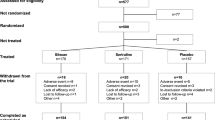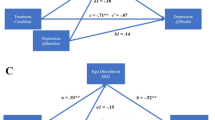Abstract
Most studies of psychosocial predictors of disease progression in HIV have not considered norepinephrine (NE), a neurohormone related to emotion and stress, even though NE has been related to accelerated viral replication in vitro and impaired response to antiretrovial therapy (ART). We therefore examined NE, cortisol, depression, hopelessness, coping, and life event stress as predictors of HIV progression in a diverse sample. Participants (n = 177) completed psychological assessment, blood draws [CD4, viral load (VL)], and a 15 h urine sample (NE, cortisol) every 6 months over 4 years. Hierarchical linear modeling (HLM) was used to model slope in CD4 and VL controlling for ART at every time point, gender, age, race, SES, and initial disease status. NE (as well as depression, hopelessness, and avoidant coping) significantly predicted a greater rate of decrease in CD4 and increase in VL. Cortisol was not significantly related to CD4, but predicted VL increase. To our knowledge, this is the first study relating NE, in vivo, to accelerated disease progression over an extended time. It also extends our previous 2 year study by relating depressed mood and coping to accelerated disease progression over 4 years.

Similar content being viewed by others
References
Mayne TJ, Vittinghoff E, Chesney MA, Barrett DC, Coates TJ. Depressive affect and survival among gay and bisexual men infected with HIV. Arch Intern Med. 1996;156:2233–8.
Leserman J, Petitto JM, Golden RN, et al. Impact of stressful life events, depression, social support, coping and cortisol on progression to AIDS. Am J Psychiatry. 2000;157(8):1221–8.
Ickovics JR, Hamburger ME, Vlahov D, et al. Mortality, CD4 cell count decline, and depressive symptoms among HIV-seropositive women: longitudinal analysis from the HIV Epidemiology Research Study. JAMA. 2001;285:1460–5.
Leserman J. HIV disease progression: depression, stress, and possible mechanisms. Biol Psychiatry. 2003;54(3):295–306.
Burack JH, Barrett DC, Stall RD, Chesney MA, Ekstrand ML, Coates TJ. Depressive symptoms and CD4 lymphocyte decline among HIV-infected men. JAMA. 1993;270(21):2568–73.
Blashill AJ, Perry N, Safren SA. Mental health: a focus on stress, coping, and mental illness as it relates to treatment retention, adherence, and other health outcomes. Curr HIV/AIDS Rep. 2011;8:215–22.
Ironson G, Balbin E, Stieren E, et al. Perceived stress and norepinephrine predict the effectiveness of response to protease inhibitors in HIV. Int J Behav Med. 2008;15:221–6.
Temoshok LR, Waldstein SR, Wald RL, et al. Type C coping, alexithymia, and heart rate reactivity are associated independently and differentially with specific immune mechanisms linked to HIV progression. Brain Behav Immun. 2008;22(5):781–92.
Pence BW, O’Donnell JK, Gaynes BN. Falling through the cracks: the gaps between depression prevalence, diagnosis, treatment, and response in HIV care. AIDS. 2012;26(5):656–8.
Leserman J, Petitto JM, Gu H, et al. Progression to AIDS, a clinical AIDS condition and mortality: psychosocial and physiological predictors. Psychol Med. 2002;32(6):1059–73.
Segerstrom SC, Miller GE. Psychological stress and the human immune system: a meta-analytic study of 30 years of inquiry. Psychol Bull. 2004;130:601–30.
Fekete EM, Antoni MH, Lopez C, et al. Stress buffering effects of oxytocin on HIV status in low-income ethnic minority women. Psychoneuroendocrinology. 2011;36(6):881–90.
Hussain D. Stress, immunity, and health: research findings and implications. IJPR. 2010;15:94–100.
Machtinger EL, Wilson TC, Haberer JE, Weiss DS. Psychological trauma and PTSD in HIV-positive women: a meta-analysis. AIDS Behav. 2012;16:2091–100.
Rose RC, House AS, Stepleman LM. Intimate partner violence and its effects on the health of African American HIV-positive women. Psychol Trauma. 2010;2:311–7.
Ironson G, Cruess D, Kumar M. Immune and neuroendocrine alterations in post-traumatic stress disorder. Psychoneuroimmunology. 2004;25(1):531–47.
Leserman J, Ironson G, O’Cleirigh C, Fordiani JM, Balbin E. Stressful life events and adherence in HIV. AIDS Patient Care STDS. 2008;22:403–11.
Patterson TL, Semple SJ, Temoshok LR, et al. Stress and depressive symptoms prospectively predict immune change among HIV-seropositive men. Psychiatry. 1995;58(4):299–312.
Ironson G, O’Cleirigh C, Fletcher MA, et al. Psychosocial factors predict CD4 and viral load change in men and women in the era of HAART. Psychol Med. 2005;67(6):1013–21.
Ironson G, Friedman A, Klimas N, et al. Distress, denial, and low adherence to behavioral interventions predict faster disease progression in gay men infected with human immunodeficiency virus. Int J Behav Med. 1994;1:90–105.
Remor E, Penedo FJ, Shen BJ, Schneiderman N. Perceived stress is associated with CD4+ cell decline in men and women living with HIV/AIDS in Spain. AIDS Care. 2007;19(2):215–9.
Ghebremichael M, Paintsil E, Ickovics JR, et al. Longitudinal association of alcohol use with HIV disease progression and psychological health of women with HIV. AIDS Care. 2009;2009(21):834–41.
Carrico AW, Riley ED, Johnson MO, et al. Psychiatric risk factors for HIV disease progression: the role of inconsistent patterns of anti-retroviral therapy utilization. J AIDS. 2011;56(2):146–50.
Alemu H, Mariam DH, Tsui A, Ahmed S, Shewamare A. Effect of depressive symptoms and social support on weight and CD4 count increase at HIV clinic in Ethiopia. AIDS Care. 2012;24:866–76.
Antelman G, Kaaya S, Wei R, et al. Depressive symptoms increase risk of HIV disease progression and mortality among women in Tanzania. J Acquir Immune Defic Syndr. 2007;44:470–7.
Bouhnik AD, Preau M, Vincent E, et al. Depression and clinical progression in HIV-infected drug users treated with highly active antiretroviral therapy. Antivir Ther. 2005;10(1):53–61.
Chida Y, Vedhara K. Adverse psychosocial factors predict poorer prognosis in HIV disease: a meta-analytic review of prospective investigations. Brain Behav Immun. 2009;23:434–45.
Kopnisky KL, Stoff DM, Rausch DM. Workshop report: the effects of psychological variables on the progression of HIV-1 disease. Brain Behav Immun. 2004;18:246–61.
Schneiderman N, Ironson G, Siegel S. Stress and health: psychological, behavioral and biological determinants. Annu Rev Clin Psychol. 2005;1:607–28.
Cole SW. Psychosocial influences on HIV-1 disease progression: neural, endocrine, and virologic mechanisms. Psychosom Med. 2008;70:562–8.
Cole SW, Korin YD, Fahey JL, Zack JA. Norepinephrine accelerates HIV replication via protein kinase A-dependent effects on cytokine production. J Immunol. 1998;161:610–6.
Cole SW, Jamieson BD, Zack JA. cAMP externalizes lymphocyte CXCR4: implications for chemotaxis and HIV infection. J Immunol. 1999;162:1392–400.
Cole SW, Kemeny ME, Fahey JL, Zack JA, Naliboff BD. Psychological risk factors for HIV pathogenesis: mediation by the autonomic nervous system. Biol Psychiatry. 2003;54:1444–56.
Collado-Hidalgo A, Sung C, Cole S. Adrenergic inhibition of innate anti-viral response: PKA blockade of Type I interferon gene transcription mediates catecholamine support for HIV-1 replication. Brain Behav Immun. 2006;20:552–63.
Sloan EK, Capitanio JP, Tarara RP, Mendoza SP, Mason WA, Cole SW. Social stress enhances sympathetic innervation of primate lymph nodes: mechanisms and implications for viral pathogenesis. J Neurosci. 2007;27:8857–65.
Cole SW, Naliboff BD, Kemeny ME, Griswold MP, Fahey JL, Zack JA. Impaired response to HAART in HIV-infected individuals with high autonomic nervous system activity. Proc Natl Acad Sci. 2001;98:12695–700.
Munck A, Guyre PM. Glucocorticoids and immune function. In: Ader R, Felton DL, Cohen N, editors. Psychoneuroimmunology. 2nd ed. San Diego: Academic Press; 1991.
Markham PD, Salahuddin SZ, Veren K, Orndorff S, Gallo R. Hydrocortisone and some other hormones enhance the expression of HTLV-III. Int J Cancer. 1986;37:67–72.
Kino T, Kopp JB, Chrousos GP. Glucocorticoids suppress human immunodeficiency virus type-1 long terminal repeat activity in a cell type-specific, glucocorticoid receptor-mediated fashion: direct protective effects at variance with clinical phenomenology. J Steroid Biochem Mol Biol. 2000;75:283–90.
Mellman TA, Kumar AM, Kulick-Bell R, Kumar M, Nolan B. Nocturnal/daytime urine noradrenergic measures and sleep in combat related PTSD. Biol Psychiatry. 1995;38:174–9.
Kumar AM, Kumar M, Fernandez JB, Mellman TA, Eisdorfer C. A simplified HPLC-ECD technique for measurement of urinary free catecholamines. J Liq Chromatogr. 1991;14:3547–57.
Beck AT. Depression: causes and treatment. Philadelphia: University of Pennsylvania Press; 1976.
Kendall PC, Hollon SD, Beck AT, Hammen CL, Ingram RE. Issues and recommendations regarding use of the Beck Depression Inventory. Cogn Ther Res. 1987;11(3):289–99.
Beck AT, Weissman A, Lester D, Trexler L. The measurement of pessimism: the Hopelessness Scale. J Consult Clin Psychol. 1974;42:861–5.
Carver CS, Scheier MF, Weintraub JK. Assessing coping strategies: a theoretically based approach. J Pers Soc Psychol. 1989;56:267–83.
Sarason IG, Johnson J, Siegel J. Assessing the impact of life changes: development of the Life Experiences Survey. J Consult Clin Psychol. 1978;46:932–46.
Chesney MA, Ickovics JR, Chambers DB, et al. Self-reported adherence to antiretroviral medications among participants in HIV clinical trials: the AACTG adherence instruments. Patient Care Committee and Adherence Working Group of the Outcomes Committee of the Adult AIDS Clinical Trials Group (AACTG). AIDS Care. 2000;12(3):255–66.
Bryk AS, Raudenbush SW. Hierarchical linear models: applications and data analysis methods. 2nd ed. Thousand Oaks: Sage; 2002.
Raudenbush SW, Bryk AS, Cheong YF, Congdon RC. HLM5: hierarchical linear and nonlinear modeling. Lincolnwood: Scientific Software International; 2002.
Beck AT, Brown G, Berchick RJ, Stewart BL, Steer RA. Relationship between hopelessness and ultimate suicide: a replication with psychiatric outpatients. Am J Psychiatry. 1990;147:190–5.
Sundstrom JB, Martinson D, Mosunjac M, et al. Norepinephrine enhances adhesion of HIV-1-infected leukocytes to cardiac microvascular endothelial cells. Exp Biol Med. 2003;228:730–40.
Christeff N, Gherbi N, Mammes O, et al. Serum cortisol and DHEA concentrations during HIV infection. Psychoneuroendocrinology. 1997;22(suppl 1):S11–8.
Mayo J, Collazos J, Martinez E, Ibarra S. Adrenal function in the HIV infected patient. Arch Intern Med. 2002;162(10):1095–8.
Chittiprol S, Kumar AM, Shetty KT, et al. HIV-1 clade C infection and progressive disruption in the relationship between cortisol, DHEAS and CD4 cell numbers: a two-year follow-up study. Clin Chim Acta. 2009;409:4–10.
Asch SM, Kilbourne AM, Gifford AL, et al. Underdiagnosis of depression in HIV: who are we missing? J Gen Intern Med. 2003;18:450–60.
Rabkin JG. HIV and depression: 2008 review and update. Curr HIV/AIDS Rep. 2008;5:163–71.
Markowitz J, Kocsis J, Fishman B, et al. Treatment of depressive symptoms in HIV-positive patients. Arch Gen Psychiatry. 1998;55:452–7.
Rabkin J, Wagner G, Rabkin R. Fluoxetine treatment for depression in patients with HIV and AIDS: a randomized, placebo-controlled trial. Am J Psychiatry. 1999;156:101–7.
Safren S, Hendriksen E, Mayer K, Mimiaga M, Pickard R, Otto M. Cognitive behavioral therapy for HIV medication adherence and depression. Cog Behav Pract. 2004;11:415–23.
Crepaz N, Passin WF, Herbst JH, et al. Meta-analysis of cognitive-behavioral interventions on HIV-positive persons’ mental health and immune functioning. Health Psychol. 2008;2008(27):4–14.
Antoni MH, Cruess DG, Cruess S, et al. Cognitive-behavioral stress management intervention effects on anxiety, 24-hr urinary norepinephrine output, and T-cytotoxic/suppressor cells over time among symptomatic HIV-infected gay men. J Consult Clin Psychol. 2000;68:31–45.
Scott-Sheldon LA, Kalichman SC, Carey MP, Fielder RL. Stress management interventions for HIV+ adults: a meta-analysis of randomized controlled trials, 1989 to 2006. Health Psychol. 2008;27:129–39.
Antoni MH, Carrico AW, Durán RE, et al. Randomized clinical trial of cognitive behavioral stress management on human immunodeficiency virus viral load in gay men treated with highly active antiretroviral therapy. Psychosom Med. 2006;68:143–51.
Saag MS, Holodnly M, Kuirzkes DR, et al. HIV viral load markers in clinical practice. Nat Med. 1996;2:625–9.
Powderly WG, Landry A, Lederman M. Recovery of the immune system with antiretroviral therapy; the end of opportunism? JAMA. 1998;280:72–7.
Ironson G, Solomon S, Balbin E, et al. The Ironson-Woods Spirituality/Religiousness Index is associated with long survival, health behaviors, less distress and low cortisol in people with HIV/AIDS. Ann Behav Med. 2002;24:34–48.
Ironson G, Cruess D, Kelsch CB, et al. Posttraumatic stress symptoms, intrusive thoughts, and disruption are longitudinally related to elevated cortisol and catecholamines following a major hurricane. JABR. 2014;19:24–52.
Acknowledgments
This research was graciously supported by the National Institute of Mental Health Grant (Grant numbers R01MH53791, R01MH066697), and the Action for AIDS Foundation (Grant number T32MH18917). Principal Investigator: Gail Ironson. We wish to thank our participants with HIV for their time and effort in making this analysis possible.
Author information
Authors and Affiliations
Corresponding author
Rights and permissions
About this article
Cite this article
Ironson, G., O’Cleirigh, C., Kumar, M. et al. Psychosocial and Neurohormonal Predictors of HIV Disease Progression (CD4 Cells and Viral Load): A 4 Year Prospective Study. AIDS Behav 19, 1388–1397 (2015). https://doi.org/10.1007/s10461-014-0877-x
Published:
Issue Date:
DOI: https://doi.org/10.1007/s10461-014-0877-x




